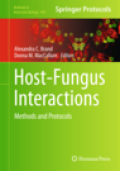
Host-fungus interactions: methods and protocols
Brand, Alexandra C.
MacCallum, Donna M.
Microbiologists, medical mycologists, immunologists, and biochemists are increasingly working together to focus on the processes involved in the progression and treatment of fungal disease. Host-Fungus Interactions: Methods and Protocols is designed for research scientists who are involved in this work and interested in undertaking new or comparative studies of interactions between themammalian host and clinically important fungal pathogens. Aiming to combine approaches for reverse genetics in pathogenic fungi with methods for their application in in vitro and in vivo models of disease, the book includes methods for the culture and genetic manipulation of the primary fungal pathogens and the opportunistic pathogens, as well as methods for investigating host-fungus interactions in model systems. Written in the highly successful Methods in Molecular Biology™ series format, chapters include introductions to their respective topics, lists of the necessary materials and reagents, step-by-step, readily reproducible laboratory protocols, and tips on troubleshooting and avoiding known pitfalls. . Comprehensive and practical, Host-Fungus Interactions: Methods and Protocols describes available molecular methods and fungal infection models in great detail in order to encourage researchers to try new approaches to investigating host-fungus interactions with added levels of confidence. Examines the culture and genetic manipulation of primary fungal pathogens as well as interactions in model systems. Includes detailed, tested methods that are ready for the lab. Features key tips and implementation advice necessary to achieve successful results. INDICE: Gene Deletion in Candida albicans Wild-Type Strains Using the SAT1-Flipping Strategy. Mini-Blaster-Mediated Targeted Gene Disruption and Marker Complementation in Candida albicans. Rapid Detection of Aneuploidy Following the Generation of Mutants in Candida albicans. Agrobacterium-Mediated Insertional Mutagenesis in Histoplasma capsulatumi. Targeted Gene Disruption in Cryptococcus neoformans Using Double Joint PCR with Split Dominant Selectable Markers. Multiple Gene Deletion in Cryptococcus neoformans Using the Cre--lox System.Gene Disruption in Aspergillus fumigatus Using a PCR-Based Strategy and In Vivo Recombination in Yeast. Targeted Gene Deletion in Aspergillus fumigatus Using the Hygromycin-Resistance Split-Marker Approach. Gene Disruption in Coccidioides Using Hygromycin or Phleomycin Resistance Markers. RNAi-Based Gene Silencing Using a GFP Sentinel System in Histoplasma capsulatum. RNA Interference in Cryptococcus neoformans. Gene Knock-Down in Paracoccidioides brasiliensis Using Antisense RNA. Tetracycline-Inducible Gene Expression in Candida albicans.Galactose-Inducible Promoters in Cryptococcus neoformans var. grubii. ModularGene Over-Expression Strategies for Candida albicans. Interactions Between Macrophages and Cell-Wall Oligosaccharides of Candida albicans. Murine Bone Marrow-Derived Dendritic Cells and T Cell Activation by Candida albicans. Phagocytosis and Intracellular Killing of Candida albicans by Murine PolymorphonuclearNeutrophils. Human Oral Keratinocytes: A Model System to Analyze Host-Pathogen Interactions. Simple Assays for Measuring Innate Interactions with Fungi. Binding and Uptake of Candida albicans by Human Monocyte-Derived Dendritic Cells. Immune Responses to Candida albicans in Models of In Vitro Reconstituted Human Oral Epithelium. Analysis of Host-Cell Responses by Immunoblotting, ELISA, and Real-Time PCR. In Vitro Model of Invasive Pulmonary Aspergillosis in the Human Alveolus. Biofilm Formation Studies in Microtiter Plate Format. Transcript Profiling Using ESTs from Paracoccidioides brasiliensis in Models of. Infection. Laser Capture Microdissection of Candida albicans from Host Tissue. Isolation and Amplification of Fungal RNA for Microarray Analysis from Host Samples. Cytokine Measurement Using Cytometric Bead Arrays (CBA). Transcript Profiling of the Murine Immune Response to Invasive Aspergillosis. Caenorhabditis elegans: A Nematode Infection Model for Pathogenic Fungi. Drosophila melanogaster as a Model Organism for Invasive Aspergillosis. Galleria mellonella as a Modelfor Fungal Pathogenicity Testing. Embryonated Chicken Eggs as Alternative Infection Model for Pathogenic Fungi. Mouse Intravenous Challenge Models and Applications. A Nebulized Intra-Tracheal Rat Model of Invasive Pulmonary Aspergillosis. Invasive Models of Histoplasmosis. Murine Model of Concurrent Oral and Vaginal Candida albicans Colonization. A Luciferase Reporter for Gene Expression Studie
- ISBN: 978-1-61779-538-1
- Editorial: Humana Press
- Encuadernacion: Cartoné
- Páginas: 598
- Fecha Publicación: 28/02/2012
- Nº Volúmenes: 1
- Idioma: Inglés
